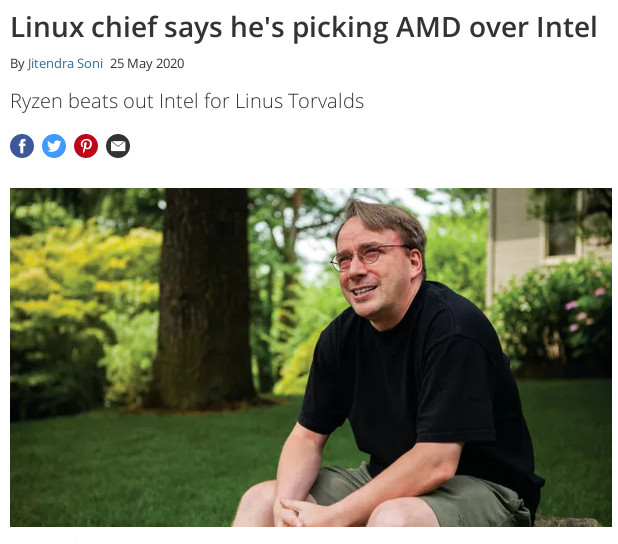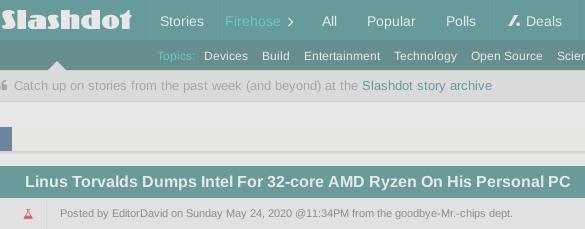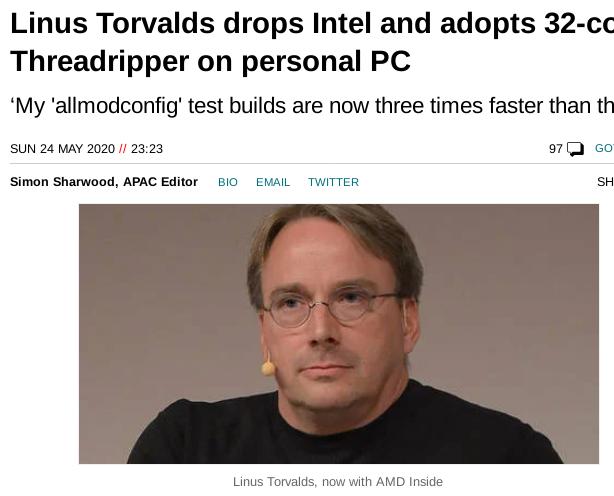





THE PAST 24 hours have been rather interesting, especially for a news watcher or neophile (news addict). They served to reinforce what we wrote back in May about media ignoring the actual Linux news and making some gossip about what computer Linus Torvalds had bought, instead. We're seeing this again today.
"And later they wonder why many people cannot take "professional" news sites seriously anymore."About 16 hours ago Mr. Torvalds announced the fifth Release Candidate (RC) of the upcoming Linux release [1]. Did the media cover that? No. Only Phoronix did [2]. LWN dropped a quick note and link a few hours ago [3].
As for the corporate media? Nothing!
In [4] and [5] Torvalds is presented as rude and outspoken. This is what people see in Google News and other mainstream channels. In [6] we see echoes of that. Then, in [7-10] it's about language wars. But nothing at all about the fifth RC of the upcoming Linux release. Nothing.
Is this unusual? No, it's typical. It's happening all the time. And later they wonder why many people cannot take "professional" news sites seriously anymore.
ZDNet's "LINUX" section says nothing about Linux (the RC); the sole headline is, "Linus Torvalds: I hope Intel's AVX-512 'dies a painful death'" (he actually said a lot more than that, explaining why AVX-512 is technically bad). ⬆
References from today's news:
Ok, so rc4 was small, and now a week later, rc5 is large.
It's not _enormous_, but of all the 5.x kernels so far, this is the rc5 with the most commits. So it's certainly not optimal. It was actually very quiet the beginning of the week, but things picked up on Friday. Like they do..
That said, a lot of it is because of the networking fixes that weren't in rc4, and I'm still not hearing any real panicky sounds from people, and things on the whole seem to be progressing just fine.
So a large rc5 to go with a large release doesn't sound all that worrisome, when we had an unusually small rc4 that precedes it and explains it.
Maybe I'm in denial, but I still think we might hit the usual release schedule. A few more weeks to go before I need to make that decision, so it won't be keeping me up at night.
The diffstat for rc5 doesn't look particularly worrisome either. Yes, there's a (relatively) high number of commits, but they tend to be small. Nothing makes me go "umm".
In addition to the outright fixes, there's a few cleanups that are just prep for 5.9. They all look good and simple too.
Anyway, networking (counting both core and drivers) amounts to about a third of the patch, with the rest being spread all over: arch updates (arm64, s390, arc), drivers (gpu, sound, md, pin control, gpio), tooling (perf and selftests). And misc noise all over.
The appended shortlog gives the details, nothing really looks all that exciting. Which is just as it should be at this time.
Go forth and test.
Thanks,
Linus
The 5.8-rc5 kernel prepatch is out for testing; it's a relatively large set of changes. "Maybe I'm in denial, but I still think we might hit the usual release schedule. A few more weeks to go before I need to make that decision, so it won't be keeping me up at night."
Linux Torvalds, the creator of Linux, offered up some interesting thoughts on Intel's Advanced Vector Extensions 512 (AVX-512) instruction set, calling it a "power virus" that was only created to make the company's CPU hardware perform well in benchmarks. He also admitted to being "biased" and "grumpy" in his assessment.
His comments came in a mailing list (via Phoronix) discussing an article suggesting AVX-512 might not be part of Intel's upcoming Alder Lake architecture. If that comes to pass, it will be just fine by Torvalds.
"I hope AVX512 dies a painful death, and that Intel starts fixing real problems instead of trying to create magic instructions to then create benchmarks that they can look good on. I hope Intel gets back to basics: gets their process working again, and concentrate more on regular code that isn't HPC or some other pointless special case," Torvalds said.
Intel introduced AVX-512 in 2013, initially as part of its Xeon Phi x200 and Skylake-X processor lines. It has also found its way into more current CPU architectures, including Ice Lake.
He notes that "in the heyday of x86", Intel's rivals always outperformed it on FP loads.
"Intel's FP performance sucked (relatively speaking), and it matter not one iota. Because absolutely nobody cares outside of benchmarks," Torvalds said.
"The same is largely true of AVX-512 now – and in the future. Yes, you can find things that care. No, those things don't sell machines in the big picture."
He continued his criticism by saying AVX512 has real downsides.
"I'd much rather see that transistor budget used on other things that are much more relevant. Even if it's still FP math (in the GPU, rather than AVX-512). Or just give me more cores (with good single-thread performance, but without the garbage like AVX-512) like AMD did."
Web performance firm Cloudflare has written about the performance impact of AVX-512. It advised customers who don't need AVX-512 for high-performance tasks to disable AVX-512 execution on the server and desktop to avoid its "accidental" throttling.
Torvalds wrote this statement against the backdrop of rumors that, in Intel’s Alder Lake processors, the AVX-512, apparently, will not be. By the way, Torvalds himself recently for the first time in 15 years replaced the Intel processor with AMD product.
As reported previously, many companies and organizations are reviewing their use of racist and exclusionary language, and the Linux kernel development team has been doing the same.
Last week, Linux creator Linus Torvalds approved an “inclusive terminology” proposal from Dan Williams for the Linux 5.8 repository, saying he “did not see a reason to wait for the next merge window."
This change means that, going forward, Linux developers will “avoid introducing new usage” of the terms “master/slave” and ‘'blacklist/whitelist.”
Linux
overlordoverseerprincipal developer Linus Torvalds has signed off on a new policy to adopt inclusive language across the project.
A Git commit adopted changes recommended by kernel developer Dan Williams, with the result that Linux will no longer refer to masters, slaves or blacklists.
In their place coders will be expected to use alternatives such as “primary” and “secondary” relationships, or refer to “leaders” and “followers”, or even “directors” and “performers”.
Blacklists are to become either “denylists” or “blocklists” and whitelists will become “allowlists” or “passlists”.
Torvalds’ commit was made on July 10th and said he thinks there’s no need for the change to wait for the next merge window for a new cut of the Linux kernel.
Torvalds later offered his weekly state of the kernel post in which he perhaps tremulously observed that while last week’s Linux 5.8-rc4 was “small”, “now a week later, rc5 is large.”
Similarly, the recommended alternatives for ‘blacklist / whitelist’ are ‘denylist / allowlist’ and ‘blocklist / passlist’. As you can see, Torvalds has given developers the choice to adopt any of the suggested ones.
“The discussion has tapered off as well as the incoming ack, review, and sign-off tags. I did not see a reason to wait for the next merge window,” reads the commit on Linux 5.8 repository.
According to the commit, old terms will be allowed only when developers are updating code for an existing (as of 2020) hardware or protocol, or when devs are dealing with specifications that mandate those terms.
The decision comes after Linux maintainer Dan Williams raised a proposal that read, “Recent events have prompted a Linuxposition statement on inclusive terminology. Given that Linux maintains a coding-style and its own idiomatic set of terminology here is a proposal to answer the call to replace non-inclusive terminology.”
Linus Torvalds, the principal engineer of the Linux kernel, has approved new terminology for its code and documentation to promote the inclusive language. The change abolishes terms such as blacklist, master, and slave.
There are no formal alternatives in place, but Torvalds suggested plenty of choices. Suggested replacements for master/slave are primary/secondary, controller/device, requester/responder, and main/replica.
Alternatives for blacklist/whitelist are denylist/allowlist and blocklist/passlist.
[...]
In May, after George Floyd’s death in the US, a string of protests sprung up worldwide to support Black Lives Matter initiatives. In a way to show solidarity, the tech community proposed to get rid of terms such as blacklist and slave.
Several major product and programming language teams including Twitter, Chrome, Android, Curl, Go, and Microsoft have also adopted alternative terminology.